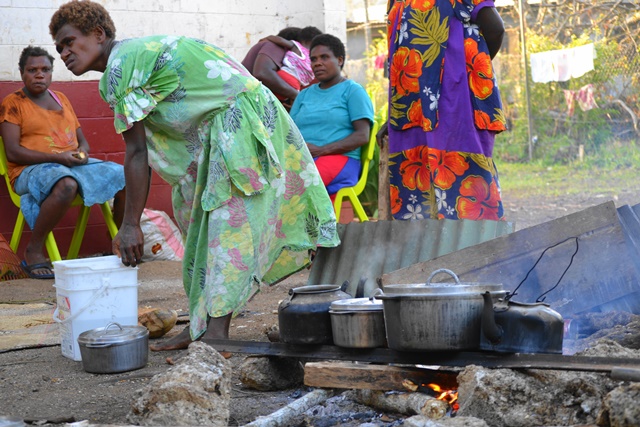UNFPA Pacific, Port Vila, Vanuatu (March 25, 2015) - As her family settled into one of the classrooms at Freswota Primary School in Cyclone Pam-stricken Port Vila, in the Pacific island nation of Vanuatu, Meri Yalu was more troubled by an impending birth rather than the storm.
The truck driver that transferred the group to the school agreed, to her great relief, to transfer her daughter Adelila Yalu to the Port Vila Central Hospital as contractions began to become more pronounced.

It was to be the beginning of a harrowing night for the first mother: her first born was going to enter the world feet first: a breech birth. The teenager birthed her daughter naturally, at the height of Cyclone Pam: with no power and in a flooded theatre.
Adelila smiles shyly when approached for her story and picture, breastfeeding baby Pamina - named for the cyclone that raged outside on her arrival by the woman who ran the evacuation centre Pamina and her family call home, for now.
Manses and Regina Kalo appear calm for a couple who are managing one of the main evacuation centers opened for Cyclone Pam in the Pacific island nation Vanuatu.
It is by default of Mr Kalo's position as school principal of Ecole Primaire de Freswota that the couple who are both teachers found themselves managing the influx of people fleeing to the school for shelter on the night of March 13.
The Kalos had time to count 750 people into the school before they had to return home to prepare their family for the brunt of Cyclone Pam - the family which lives in the school compound awoke to alittle over 1000 people.
Mr Kalo said most of the families were subsistence farmers; apart from losing their homes, the families are now facing financial, food and water security issues for the next few months.
"Some of them went straight back to their areas to assess the damage to their homes; men started rebuilding with whatever they had immediately and replanting. Some have moved back but it will now be about basics - food and water," Mr Kalo said.
"Some came with nothing but the clothes on their back. They are in need of assistance and this is why it has been good that some non-government organizations came early with some basics."
The couple run a tight ship; they are well aware of the potential for violence in situations where as many as 50 people share a classroom. A roster of duties has been formulated and Mrs Kalo walks through the school every morning to ensure a level of hygiene is maintained.
"The majority of those who came were women and there were more than 10 expectant mothers; one was born in the night of the cyclone and another was rushed to hospital the next day," Mrs Kalo said as she walked UNFPA through the school which while not full to capacity, was still filled with evacuees.
"I encourage them to sun their beddings and maintain clean bathroom facilities. At 9pm every night, we close the gates."
A 2012 study on the prevalence of violence against in Vanuatu reported 60 per cent intimate partner violence and 48 per cent non-partner violence. Gender-based violence (GBV) can be exacerbated in emergency evacuation centers and host-family accommodation. Vanuatu civil society partners had concrete and safe ways for supporting GBV prevention and response.

"We know there are high incidences of GBV from the 2012 Family Health and Safety Studies. We are monitoring this aspect very carefully because if women are not reporting or unable to access health care then we want to understand what the barriers are and be able to respond," Maha Muna, UNFPA Gender Adviser said.
The NDMO notes that evacuation centers have begun to shut down as people return home; 35 remain open, housing over 3000 people. UN agencies, coordinated by the Gender and Protection Cluster, are supporting the Government to ensure safe, informed and voluntary return.
Based on the findings of the 2013 Demographics Health Survey, the United Nations Population Fund (UNFPA) estimates there are 56,000 women of reproductive age of which 6700 are estimated to be pregnant. It's estimated that 300 women may experience pregnancy-related complications over the next three-month period.


